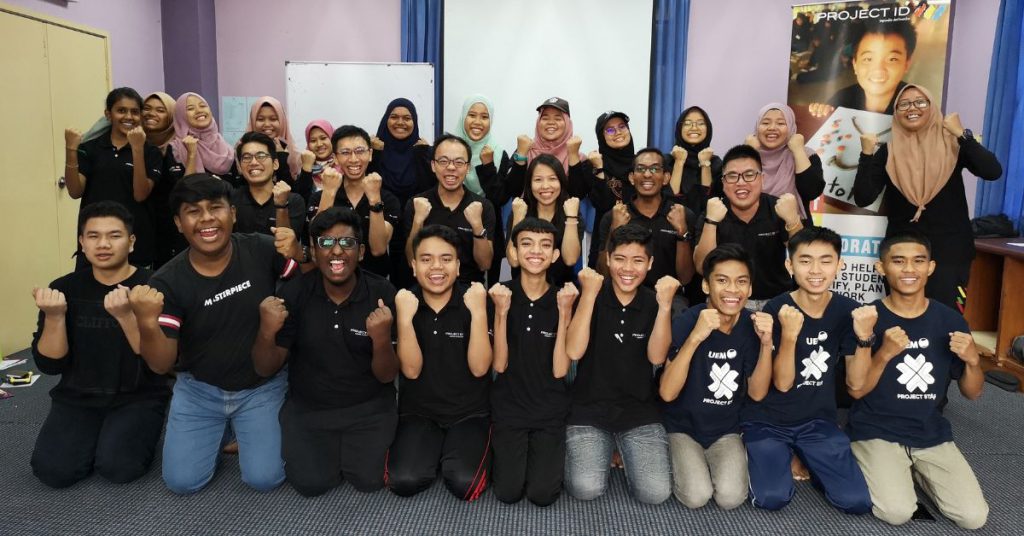When I was in high school, I felt as though all I learnt was the importance of achieving good academic results.
In the end, school became more of a routine instead of an experience that would equip me for life after school. Turns out, I am not the only one who feels this way.
Kelvin Tan, CEO of Project ID apparently has the same mindset as me. Prior to starting Project ID, Kelvin was a public school teacher under the Teach For Malaysia Fellowship (first cohort).
Having taught in a school based in a predominantly low-income community, he saw that there were very few opportunities and very little exposure for the students to succeed in life.
Though there were programmes that students could pay to join, not everyone in the community could afford them.
As a former student at a public school, I can agree with Kelvin’s interpretation that these programmes were often not meaningful enough for students as they do not take student and community context into consideration.
Seeing the plight of students from low-income communities, Kelvin decided to pilot a one-year programme with a few activities to help students identify their ambitions and equip them with a set of core values.
Project ID was founded whilst Kelvin was still a teacher. In 2019, he set up a full-time team and in April 2021, he transitioned into a full-time CEO role at Project ID.

What started as a simple school-based initiative, has now evolved into a full-fledged social enterprise.
All programmes conducted by Project ID are free of charge. However, some programmes do have certain eligibility criteria, especially those that have limited spaces or specific criteria from funders.
Soft skills are much more important than you think
Over time, the team started receiving support from parents, students, and the local school community.
“We saw some successes, including students speaking up, feeling more confident about themselves, and having more clarity of their future pursuits,” added Kelvin.

The team believes that their programmes serve as opportunities for students to develop good mindsets and important soft skills to help them succeed in their lives.
“Good grades do not mean everything, especially in the context of securing prestigious scholarships and university placements,” explained Kelvin.
According to Kelvin, many studies have shown that soft skills such as communication, teamwork, and conflict management are critical to young people’s success in the workplace and life development.

Kelvin adds that this is particularly crucial for students from low-income communities who may experience greater challenges in their lives where opportunities are slim.
Unleashing students’ creativity
Project ID’s programmes are conducted throughout the school year and are generally catered towards the secondary school age bracket. They also cater to youths who are interested in upskilling themselves in terms of self-development.
Leveraging what students tell them, they design innovative experiences where students are encouraged to co-create and co-lead with them.

“They help keep us accountable and our work hyper-relevant to their needs,” said Kelvin.
The Young Educators Challenge (YEC) is one of the ways Project ID applies this co-leading learning concept. This programme involves classroom innovations from students of different ages.
Through this, students are empowered to take ownership when they express their creativity in designing their own online lessons.
They are also able to drive innovations in teaching pedagogy (the method and practice of teaching, especially as an academic subject or theoretical concept), and sharing solutions to better improve the learning experience.

In December 2021, the team hosted EduKerjaya, a career aspirations programme to prepare underserved students with mindsets and skills needed for the modern workplace.
Getting on track with mini-internships
During their EduKerjaya programme, around 40 participants secured mini-internship placements with 10 employers from different industries.
Before the internship applications, participants underwent a bootcamp on career preparation. This included attending workshops with dedicated facilitation and mentoring on resume writing.
The participants also covered email and cover letter writing, interview tips and techniques as well as a session on managing failure and rejection.
After the bootcamp, students were encouraged to send in their internship application to Project ID’s employer partners in EduKerjaya.
“We are very grateful to have companies and firms such as Skrine, DHL, and CIMB Foundation for being supportive with our cause in providing early career exposure for young Malaysians,” expressed Kelvin.
Be the change that you want to see
Partners that are not familiar with the social enterprise usually take time to understand the value created in the programmes.
Hence, Project ID often relies on student feedback, demonstrating clear outcomes, and partners’ testimonials based on their experience with the social enterprise.
Additionally, Project ID has two pillars: social, and enterprise. Their social pillar is driven by organisational missions and is focused on developing innovative education-based programmes that drive social mobility for low-income communities.
The enterprise pillar provides advisory services, develops and delivers programmes to clients (CSOs, Foundations, Corporate CSR) looking to activate their social impact and education-based priorities.
Through the enterprise pillar, the team self-fund some of their pro-bono projects that they believe are meaningful and can create change, but are unable to raise funds. Among the projects are Student Voice Matters and PID Online.

With that being said, Project ID also has programmes that cater to certain schools. For instance, they run effective study skills workshops for schools in Semporna, Sabah. There, they’ve also conducted an Internet4U campaign to provide free Internet to underserved students.
To date, Project ID has made an impact by building a student community and network of more than 700 young people across Malaysia, according to Kelvin, and they can only go up from here.
Featured Image Credit: Project ID











